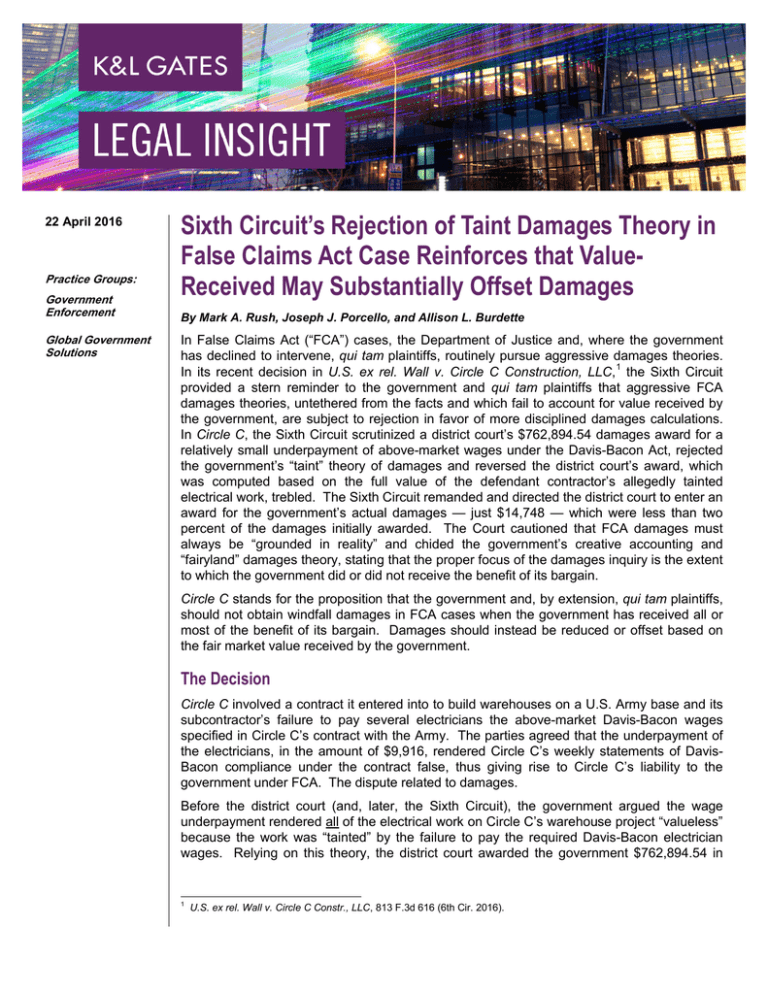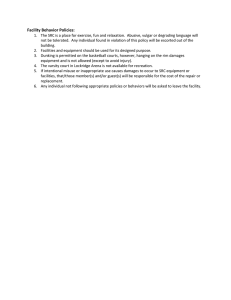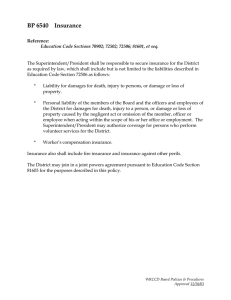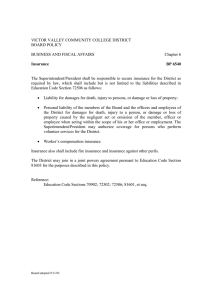
22 April 2016
Practice Groups:
Government
Enforcement
Global Government
Solutions
Sixth Circuit’s Rejection of Taint Damages Theory in
False Claims Act Case Reinforces that ValueReceived May Substantially Offset Damages
By Mark A. Rush, Joseph J. Porcello, and Allison L. Burdette
In False Claims Act (“FCA”) cases, the Department of Justice and, where the government
has declined to intervene, qui tam plaintiffs, routinely pursue aggressive damages theories.
In its recent decision in U.S. ex rel. Wall v. Circle C Construction, LLC,1 the Sixth Circuit
provided a stern reminder to the government and qui tam plaintiffs that aggressive FCA
damages theories, untethered from the facts and which fail to account for value received by
the government, are subject to rejection in favor of more disciplined damages calculations.
In Circle C, the Sixth Circuit scrutinized a district court’s $762,894.54 damages award for a
relatively small underpayment of above-market wages under the Davis-Bacon Act, rejected
the government’s “taint” theory of damages and reversed the district court’s award, which
was computed based on the full value of the defendant contractor’s allegedly tainted
electrical work, trebled. The Sixth Circuit remanded and directed the district court to enter an
award for the government’s actual damages — just $14,748 — which were less than two
percent of the damages initially awarded. The Court cautioned that FCA damages must
always be “grounded in reality” and chided the government’s creative accounting and
“fairyland” damages theory, stating that the proper focus of the damages inquiry is the extent
to which the government did or did not receive the benefit of its bargain.
Circle C stands for the proposition that the government and, by extension, qui tam plaintiffs,
should not obtain windfall damages in FCA cases when the government has received all or
most of the benefit of its bargain. Damages should instead be reduced or offset based on
the fair market value received by the government.
The Decision
Circle C involved a contract it entered into to build warehouses on a U.S. Army base and its
subcontractor’s failure to pay several electricians the above-market Davis-Bacon wages
specified in Circle C’s contract with the Army. The parties agreed that the underpayment of
the electricians, in the amount of $9,916, rendered Circle C’s weekly statements of DavisBacon compliance under the contract false, thus giving rise to Circle C’s liability to the
government under FCA. The dispute related to damages.
Before the district court (and, later, the Sixth Circuit), the government argued the wage
underpayment rendered all of the electrical work on Circle C’s warehouse project “valueless”
because the work was “tainted” by the failure to pay the required Davis-Bacon electrician
wages. Relying on this theory, the district court awarded the government $762,894.54 in
1
U.S. ex rel. Wall v. Circle C Constr., LLC, 813 F.3d 616 (6th Cir. 2016).
Sixth Circuit’s Rejection of Taint Damages Theory in False Claims Act Case
Reinforces that Value-Received May Substantially Offset Damages
damages (the entire $259,298.18 the government paid for the electrical work on the Army
warehouses, trebled, minus $15,000 previously paid in settlement by the subcontractor).
On February 4, 2016, the Sixth Circuit issued its opinion rejecting the government’s
“creative” damages accounting in its FCA claim. The Court declared that the district court’s
award was based on “fairyland” damages rather than actual damages. Actual damages “are
the difference in value between what the government bargained for and what the
government received.” Since the government received the warehouses for which it had
bargained, the government’s actual damages were the amount of the wage underpayment.
The “taint” was made right by the treble damages available under FCA. The Sixth Circuit
distinguished the Circle C case from cases where the goods delivered to the government
were actually valueless because the goods were dangerous to use (such as helicopters with
defective transmissions) or morally tainted (such as uniforms manufactured by child laborers
in Indonesia). In those cases, an award equal to the full value of the contract may be
appropriate. In contrast, money damages could remedy the wage underpayment in the
Circle C case “every day.” 2 The Sixth Circuit thus reversed the district court’s award and
remanded the case with the instruction to enter a judgement of $14,748, the government’s
actual damages of $9,916 tripled according to 31 U.S.C. § 3729(a)(1)(G), minus $15,000
already paid by the subcontractor in settlement of the underpayment issue. The Sixth Circuit
described the revised damages as appropriately reflecting reality.
Key Takeaways
The Sixth Circuit’s ruling in Circle C makes it clear that, when it comes to damages in FCA
claims, some courts will closely scrutinize whether the government received the value it
bargained for and will base damages awards on that analysis. In cases where the
government has received all or most of the benefit of its bargain, the fair market value of the
goods or services received may serve to substantially reduce or offset the government’s
actual damages. This decision may be of particular relevance in false certification FCA
actions where the statement certifies compliance with voluminous regulations and where a
minor technical violation occurred. A prime example is FCA actions against healthcare
providers that seek government payments based on accurate bills for competently provided
and medically necessary services but nonetheless fail to comply with one or more technical
regulatory requirements. Under such circumstances, Circle C may support a substantial
offset of claimed damages where the government has received the full value of the services
for which it contracted.
The Sixth Circuit’s ruling also provides a reminder to FCA defendants of the importance of
early case evaluation, with a strategic focus on their damages theory and a realistic
assessment of their potential exposure. Although it may be counterintuitive, depending on
the nature of the case, FCA defendants, working with their outside counsel, may be best
served to focus more closely on damages than liability at the outset to understand what is
really at stake.
2
Id. A concurrence to the Sixth Circuit’s opinion sought to clarify that it is not danger or immorality that render goods
valueless, thereby making the damages award of the entire contract value appropriate. Instead, the basis of damages
rests on “the extent to which the value of the injury to the public interest is calculable in terms of market value.” As such,
the Sixth Circuit’s revised damages award was appropriate because the market value of the wage underpayment could be
“precisely ascertained.” Id. at 619 (Rogers, J., concurring).
2
Sixth Circuit’s Rejection of Taint Damages Theory in False Claims Act Case
Reinforces that Value-Received May Substantially Offset Damages
Authors:
Mark Rush
mark.rush@klgates.com
+1.412.355.8333
Joseph J. Porcello
joseph.porcello@klgates.com
+1.412.355.6419
Allison L. Burdette
allison.burdette@klgates.com
+1.412.355.7475
Anchorage Austin Beijing Berlin Boston Brisbane Brussels Charleston Charlotte Chicago Dallas Doha Dubai Fort Worth Frankfurt
Harrisburg Hong Kong Houston London Los Angeles Melbourne Miami Milan Newark New York Orange County Palo Alto Paris Perth
Pittsburgh
Portland
Raleigh
Research Triangle Park
San Francisco
São Paulo
Seattle
Seoul
Shanghai
Singapore
Spokane
Sydney Taipei Tokyo Warsaw Washington, D.C. Wilmington
K&L Gates comprises more than 2,000 lawyers globally who practice in fully integrated offices located on five
continents. The firm represents leading multinational corporations, growth and middle-market companies, capital
markets participants and entrepreneurs in every major industry group as well as public sector entities, educational
institutions, philanthropic organizations and individuals. For more information about K&L Gates or its locations,
practices and registrations, visit www.klgates.com.
This publication is for informational purposes and does not contain or convey legal advice. The information herein should not be used or relied upon in
regard to any particular facts or circumstances without first consulting a lawyer.
© 2016 K&L Gates LLP. All Rights Reserved.
3






